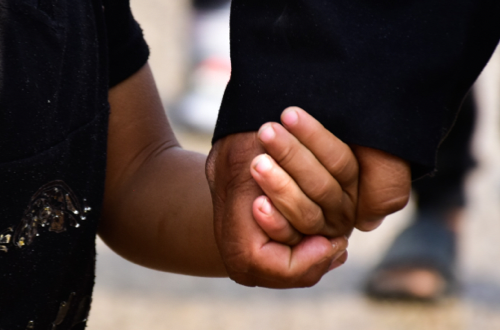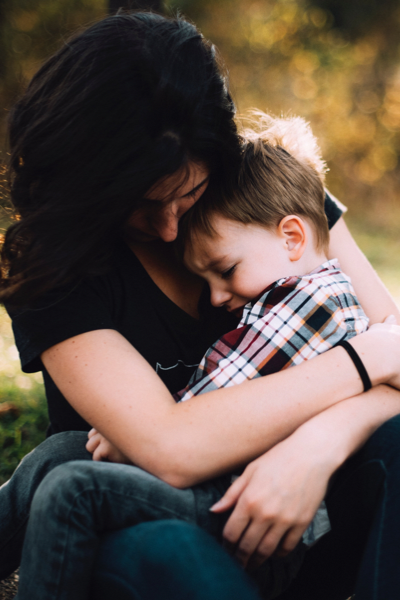5 Tips for Helping Your Anxious Child
Does helping your anxious child, or teen, bring on worry, fear or anxiety for you? Do you ever feel frustrated or powerless trying to help them? Are you overwhelmed with all of the advice and recommendations you get from family, friends, social media, schools?
I’m Nicole Goudreau-Green, a therapist in Westchester County, NY, specializing in therapy for anxiety and family therapy. One of the first questions I get when working with parents of anxious children is: “How can I help them? Tell me what I can do.”
This question often comes from a place of heartbreak, sadness and fear in wanting to help your anxious child. So let’s talk about it more. The first thing you can do is know when it’s time to get support for your child. And for yourself.
Let’s dive deeper into all of this. First by talking about what anxiety is.
“Is it normal for my child to feel anxious?”
Some level of anxiety, worry or fear is normal and important to experience, whether you're an adult or child. When anxiety begins to interfere with daily life, that is when it becomes problematic and potentially an Anxiety Disorder.
As an emotion, anxiety (aka worry and fear) is an internal cue that something is going on and needs attention. Despite how annoying anxiety can seem at times, it has been historically functional for us as humans. It cues us to some kind of danger: physical, emotional, spiritual, relationship, or other.
Let’s look at a couple examples:
For a school aged child, they may experience worry when they are in an unfamiliar space. For example, a new school. This worry may cause them to be cautious and hesitant to engage within the environment.
They may be hesitant to approach the staff, kids and the physical space. This is a normal, protective response to a new environment.
If the anxiety decreases as time and experience in the new space increases, it’s “normal.”
If the child’s anxiety sticks around and interferes with their ability to engage in school, it may indicate something more. Getting support from a mental health or school professional may be helpful.
For a teen, they may experience anxiety in preparing for an upcoming test. Their anxiety may cause them to think about how best to study, how long to study, where to study.
If the teen is able to study, take the exam and the feeling passes, the anxiety is “normal.”
If they aren’t able to focus on studying, avoid studying, or anxiety continues beyond the test, this may indicate difficulty with anxiety. And a sign to seek support.
When anxiety begins to interfere with a child or teen’s:
Ability to focus on and complete school work.
Ability to socialize with peers (often avoiding these interactions).
Physical health (they may complain of nausea or digestive issues that go unexplained by the pediatrician).
Behaviors: They may seem more irritable, sensitive or avoidant. They may also be crying more frequently.
Sleep: difficulty falling asleep or waking up frequently throughout the night.
This may indicate an Anxiety Disorder. It’s worth getting a professional assessment by a therapist, psychologist or psychiatrist
Honestly, getting support at any time is great and will contribute to helping your anxious child. Doing this proactively can be even better. So if you’re able to manage it, find a therapist or school support who can help you child. Someone who can help them learn about their emotions and ways to deal with them.
Tip #1 in Helping Your Anxious Child: Avoid Problem Solving.
When your child expresses anxiety, fear or worry, avoid problem solving. I know this may go against your instincts, but problem solving can be ironically problematic.
Problem solving is typically only a quick fix when it comes to dealing with anxiety. For example, if you're helping your anxious child or teen by resolving relationship conflict, they miss an opportunity for two things...
First, a chance to learn that things can work out just fine, even when they fear the worst.
Second, a chance to learn conflict resolution, communication skills and emotion regulation skills.
Problem solving, while not your intention, can cause your child to believe that they are incapable of managing their anxiety. This may validate their fear that they’re not capable of dealing with conflict.
They may come to think that nothing they do will help decrease their anxiety or resolve conflict. So they “have to avoid friendships or conflict all together.
So what can you do instead?
Tip #2 for Helping Your Anxious Child: Validation.
Offer validation of what your child is feeling. Not of their belief, behavior or the situation. Focus on the feeling. This does not mean that you agree with a behavior or perspective. It is simply expressing that you see and understand the feeling they’re experiencing.
This will go a long way. It will help them feel understood and allowed to experience their emotions. They will take this with them throughout their life.
Depending on their age, how you validate will vary:
For younger children:
Offering a hug or holding them can be comforting and validating. You may also want to put a name to the feeling you think they might be experiencing.
If it’s developmentally appropriate you can ask them what they’re feeling. They might share physical sensations or use feeling words. Really listen.
Helping your anxious child put words to their emotions and thoughts goes a long way. Here’s a link to an emotion chart that comes in really handy with kids, teenagers and even us adults: “How Are You Feeling Today?” You can also just Google one.
For tweens and teens, here are some helpful tips:
Reflect back what you hear them saying. Ask if you are understanding it correctly.
Be honest and genuine. If you’re having a hard time putting yourself in their shoes, you can say something like: “I’m having a hard time imagining what it’s like to go through that. I wish I could understand better. What I do see is that you’re in pain and this looks like it’s really hard to go through.”
Give nonverbal validation. Maintain eye contact while you’re having the conversation about what’s upsetting them. Nod in understanding. Ask them if you can give them a hug.
Tip #3 for Helping Your Anxious Child: Skills You Can Encourage.
While problem solving is discouraged, helping your child learn to cope with the anxiety or other emotion is encouraged. This can be through direct teaching or action, role modeling, or encouraging them to use a skill they’ve learned.
I recommend using a grounding skill first. Like #’s 1 and 3 below, especially if their level of worry and fear is high. Then move onto another skill, like #’s 2 and 4.
Here are some basic skills you can use with your anxious child:
“Paced Breathing:” Ask your child to breathe with you. Breathe in for 4 seconds and out for 6 seconds. You can also breathe in for 4, hold your breath for 2, breathe out for 4, hold your breath for 2 and repeat this.
Ask them to go on a walk or bike ride with you. Or encourage them to talk a walk on their own if they’re old enough.
Grounding with senses: Ask your child what colors they see around them in the room. Ask them to describe the shapes they see. Ask them what noises they hear. Ask them to notice any smells.
Encourage them to draw what they’re feeling or journal it. If they’re willing to share it with you, even better. The little ones will gladly share this with you.
When they get into middle and high school, they may be less likely to share it with you. And that’s okay. That doesn’t mean it’s not working. The purpose is to encourage them to feel it and know the world won’t end if they do.
Tip # 4: Helping Your Anxious Child by Allowing for Independence.
This may require some will power and self-soothing on your part as a parent. When a child or teen is experiencing anxiety, it’s instinctual for parents to come closer, comfort and resolve things for them.
Give them some space and time to be alone with their thoughts and feelings. It will give them a chance to learn to self-soothe, problem solve and gain confidence.
I’m not talking about an hour here. Start small with 3-5 minutes and build up. I know even a minute can feel like an eternity when your child is in pain.
Notice what emotions and thoughts come up for you as you allow this to play out. Notice if you are catastrophizing, exaggerating, or using black or white thinking. These are common, and often unhelpful.
If your child is safe, allow them space.
Tip #5: Access Your Own Support System.
Parents, mother’s in particular, put the care of their child first and forget about their own basic needs. Especially when you're focused on helping your anxious child.
When you’re tired, hungry, and not tending to your own emotional health, you're less likely to be helpful.
Get support from trusted friends and family. Talk to them about what you're going through or spend some time with them for a break.
Ask your partner for support and tag each other in and out when needed.
Seek out your own therapist or qualified wellness coach.
Take time for yourself. Take a walk, go for a massage, drink some tea, read a book.
Helping your anxious child means helping yourself too. Be kind, patient and generous in how you talk to and treat yourself. It will also be a great way to role model for your child.
If you’re in New York and think you might benefit from therapy for yourself or your family, please don’t hesitate to reach out or book a free 15 minutes phone consultation.
If you’re a mom, outside of the NY area, and are looking for support, check out “Uncovering Mama,” a 6-Week Coaching Group for mothers parenting emotionally sensitive children. In this group you will receive helpful advice and learn more about navigating the frustration, guilt and fear that comes along with parenting an emotionally sensitive child. You will also meet other moms experiencing similar situations.
With admiration and respect,
Nicole





